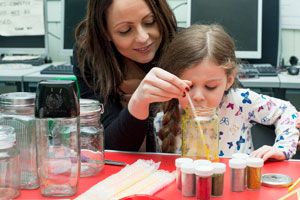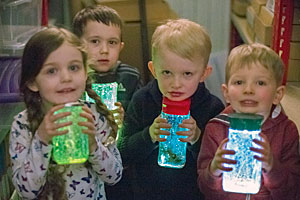Sciences in Curriculum for Excellence
What is science?
Science is the study of the physical world, where we establish facts by inquiry, investigation and observation. Studying science helps us understand how the world works.
Science is an important part of our heritage – so many Scottish scientists have shaped the modern world as we know it and we use these applications every day in our lives, at work, leisure and home.
In a modern and ambitious world like ours, science and its application are central to our economic future, our health and wellbeing as individuals and as a society.
What skills will my child develop?
Learning in the sciences will enable your child to:
- develop curiosity and understanding of the environment and their place in the living, material and physical world
- demonstrate a secure knowledge and understanding of the big ideas and concepts of the sciences
- develop skills for learning, life and work
- develop the skills of scientific inquiry and investigation using practical techniques
- develop skills in the accurate use of scientific language, formulae and equations
- apply safety measures and take necessary actions to control risk and hazards
- recognise the impact science makes on their life, the lives of others, on the environment and in society
- recognise the role of creativity and inventiveness in the development of science
- develop an understanding of the Earth's resources and the need for responsible use of them
- express opinions and make decisions on social, moral, ethical, economic and environmental issues, based upon sound understanding
- develop as a scientifically-literate citizen with a lifelong interest in science
- establish the foundation for more advanced learning and future careers in science and technology.
What will my child learn?
 Each area of the curriculum is broken down into experiences and outcomes. These are clear and concise statements about children's learning and progression from pre-school to S3.
Each area of the curriculum is broken down into experiences and outcomes. These are clear and concise statements about children's learning and progression from pre-school to S3.
In the sciences, the headings used to group the experiences and outcomes are:
- Planet Earth: exploring the diversity of living things, developing their understanding of how organisms are interrelated, exploring types, sources and uses of energy, exploring the changing states of matter and the physical and chemical processes upon earth and developing understanding of the earth's position within the universe.
- Forces: developing an understanding of how forces can change the shape or motion of an object and the forces acting on it and developing an understanding of the concept of buoyancy, force and density.
- Electricity and waves: knowing how to use electricity safely, understanding of electricity as a means of transferring energy by investigating circuits and building chemical cells, exploring the nature of sound, light and radiations in the electromagnetic spectrum and understanding of the properties of light and other forms of electromagnetic radiations.
- Biological systems: developing knowledge and understanding of the structure and function of organs of the body, through observation, research and practical investigation learners explore the risk and impact of microorganisms in relation to health, and then in industrial processes, experience the use of technology in monitoring health and improving the quality of life and developing knowledge of genetics and of the role of DNA.
- Materials: exploring the properties of different substances and how they can be changed to develop their understanding of the connection between structure and properties, exploring the development of new substances which have useful properties and beginning to use symbols and chemical formulae as a way of communicating information about elements and compounds, developing knowledge and understanding of substances that make up the Earth's surface.
- Topical science: By considering current issues of science, learners increasingly develop their understanding of scientific concepts and their capacity to form informed social, moral and ethical views. They reflect upon and critically evaluate media portrayal of scientific findings.
In addition, there are key skills embedded within the curriculum and developed progressively from Early Level to Fourth Level under the headings:
- Inquiry and investigative skills
- Scientific analytical thinking skills
- Skills and attributes of scientifically literate citizens
How can I support my child's learning?
Parentzone's Supporting science at home section has simple ideas to support your child in learning about the sciences through everyday activities.
How are children and young people learning in Scotland?
 Science learning can be experienced in a huge variety of exciting and inspiring ways. Children might be:
Science learning can be experienced in a huge variety of exciting and inspiring ways. Children might be:
- outside making a bug hotel using different materials
- investigating light and shadow
- playing a ball game to investigate forces
- exploring their local area to find out what wildlife lives there or about the different kinds of rock that make up the earth’s crust.
Learning in science often links to Learning for Sustainability and the Sustainable Development Goals. This helps learners to understand how the sciences play a vital role in finding solutions to real world issues or challenges such as protecting biodiversity, reducing marine plastic pollution and tackling climate change.
Curriculum for Excellence has enabled teachers to use different approaches to learning, to inspire a life-long passion for science in children by connecting their learning to the real world.
- By linking with local industries, schools can show science and STEM in action.
- Project-based learning approaches combine the individual disciplines within STEM (Science, Technology, Engineering and Mathematics). This can create exciting learning experiences for young people where they can work in teams to solve problems or tackle challenges.
- The sciences are one of eight curriculum areas within Curriculum for Excellence. Therefore, learning about the sciences from Early Level to Third Level is an entitlement for all learners. Learning in the sciences should be delivered through an appropriate blend of well-planned discrete and interdisciplinary learning.
- In some Primary schools, time may be specifically allocated to sciences. While in other schools, science may be embedded within the curriculum so you might be learning about the Titanic and finding out about forces or learning about World Wars or finding out about trench diseases.
Careers in the sciences
Scotland offers many exciting and rewarding careers in the sciences and engineering, as do other countries around the world. The sciences are vital for key economic sectors in Scotland, such as energy, the creative industries (including digital), food and drink and life sciences.
It is often thought that these careers are only available to those who have a university degree in a science or engineering related subject, but many opportunities also exist for modern apprentices and for technician-level roles too.
The skills gained through the sciences can also open doors to careers in many other sectors. For instance, transferable skills such as the ability to solve problems, make accurate predictions and draw valid conclusions are useful in many different careers outwith science. As a result, science skills are much valued by employers.
